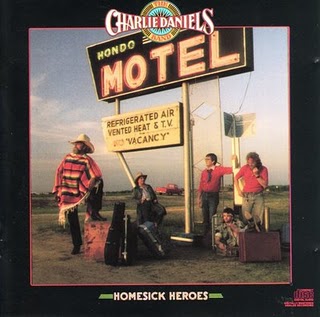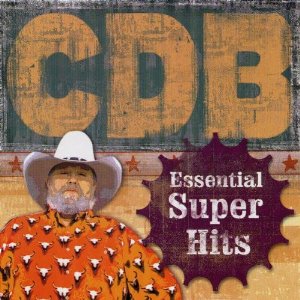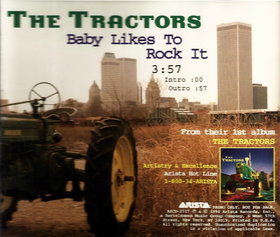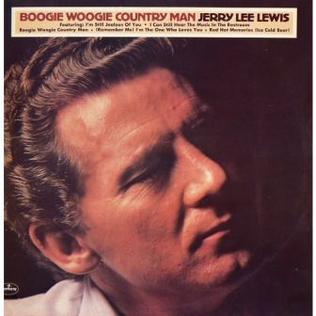Related Research Articles
Boogie-woogie is a genre of blues music that became popular during the late 1920s, developed in African-American communities in the 1870s. It was eventually extended from piano, to piano duo and trio, guitar, big band, country and western music, and gospel. While standard blues traditionally expresses a variety of emotions, boogie-woogie is mainly associated with dancing and Boogie-woogie dance.

"The Devil Went Down to Georgia" is a song written and performed by the Charlie Daniels Band and released on their 1979 album Million Mile Reflections.

"Boogie Woogie Bugle Boy" is a World War II jump blues song written by Don Raye and Hughie Prince which was introduced by The Andrews Sisters in the Abbott and Costello comedy film Buck Privates (1941). The Andrews Sisters' Decca recording reached number six on the U.S. pop singles chart in the spring of 1941 when the film was in release. The song is ranked No. 6 on Songs of the Century. Bette Midler's 1972 recording of the song also reached the top ten on the U.S. Billboard Hot 100.

Lovin' and Learnin' is the fifth studio album by American country music singer Tanya Tucker. It was released on January 5, 1976, by MCA Records. The album was produced by Jerry Crutchfield and includes two top ten singles, "Don't Believe My Heart Can Stand Another You" and "You've Got Me to Hold On To".
"Honky Tonk Blues" was a hit country and western song written and performed by Hank Williams. The original 1952 recording was a major hit, and it later became a hit for later-day superstar Charley Pride.
"That Lucky Old Sun " is a 1949 popular song with music by Beasley Smith and words by Haven Gillespie.

"Boot Scootin' Boogie" is a song first recorded by the band Asleep at the Wheel for their 1990 album, Keepin' Me Up Nights. American country music duo Brooks & Dunn recorded a cover version, which was included on their 1991 debut album, Brand New Man. It originally served as the B-side to their second single, "My Next Broken Heart". It became the duo's fourth single release and fourth consecutive number-one single on the U.S. Billboard Hot Country Singles chart.

This is a detailed discography for American musician Charlie Daniels. Much of his output, including all of his studio albums from 1974 to 1989, is credited to the Charlie Daniels Band.

"T-R-O-U-B-L-E" is a song written by Jerry Chesnut and recorded by Elvis Presley in March 1975. It was released as a single, as the A-side, with the B-side "Mr. Songman", through RCA Victor that was taken from his album Today. It is not to be confused with the Leiber and Stoller song "Trouble", that Presley first recorded in July 1958, and which was subsequently recorded by numerous other artists.

"Guitar Boogie" is a guitar instrumental recorded by Arthur "Guitar Boogie" Smith in 1945. It was one of the first recordings in the style later dubbed "hillbilly boogie" to reach a widespread audience, and eventually sold nearly three million copies. It was the first guitar instrumental to climb the country music charts, and then crossover and also gain high rankings on the popular music charts. "Guitar Boogie" has been interpreted and recorded by a variety of musicians. It is among the songs discussed as the first rock and roll record.

"Mississippi", is a song written by Charlie Daniels and first released on the Charlie Daniels Band's 1979 album Million Mile Reflections. It was also released as a single in September 1979 as the follow-up to "The Devil Went Down to Georgia." It reached the top 20 on the country singles charts in both the U.S. and Canada.

Homesick Heroes is the fifteenth studio album by Charlie Daniels and the twelfth as the Charlie Daniels Band, released on August 15, 1988. The album is known for the band's cover of the Jimmy Dean classic, "Big Bad John," which also includes guest harmony vocals by The Oak Ridge Boys, and for the song "Uneasy Rider '88" which is musically and thematically similar to their renowned 1973 song "Uneasy Rider" but with a story set in a Houston, Texas gay bar.
"Cherokee Fiddle" is a song written by Michael Martin Murphey. Murphey's version of the song went to number 58 on the Hot Country Singles chart in 1977. The story is based on a fiddle player nick named "Scooter"; his real name was Dean Kirk. He was of Choctaw Indian and Irish descent. Having taken lessons as a child from Clayton McMichem, he played the fiddle his entire life. He once worked with the country music and movie star, Rex Allen. In his later years he played at the narrow gauge train station in Silverton, Colorado.
"A Better Love Next Time" is a song written by Johnny Christopher and Bobby Wood, and recorded by American country music artist Merle Haggard backed by The Strangers. It was released in July 1989 as the second single from the album 5:01 Blues. The song reached number 4 on the Billboard Hot Country Singles & Tracks chart. It was Haggard's last Top Ten hit. It was co-produced by Mark Yeary, keyboardist of The Strangers.

Essential Super Hits is a compilation album by American musician Charlie Daniels. Released on July 27, 2004, the compilation consists of a compact disc of Daniels' hits, and a 5-song DVD video.

Fiddle Fire: 25 Years of the Charlie Daniels Band is a compilation album by American musician Charlie Daniels. Released on August 18, 1998, the album consists of re-recordings of a number of his hits. The compilation was reissued on July 12, 2005.

"Baby Likes to Rock It" is a song written by Steve Ripley and Walt Richmond, and recorded by American country music group The Tractors. It was released in August 1994 as the first single from their self-titled album. The song reached number 11 on the Billboard Hot Country Singles & Tracks chart and peaked at number 8 on the RPM Country Tracks chart in Canada.
"If You Want to Be My Woman" is a song written and recorded by American country music artist Merle Haggard backed by The Strangers. It was released in December 1989 as the third single from his album 5:01 Blues. The song peaked at number 23 on the Billboard Hot Country Singles & Tracks chart and reached number 15 on the RPM Country Tracks chart in Canada.

Boogie Woogie Country Man is the 30th album by Jerry Lee Lewis released on Mercury Records in 1975.

"Rockin' Pneumonia and the Boogie Woogie Flu" is a song written and originally recorded by Huey 'Piano' Smith in 1957, who scored a minor Billboard hit with the song peaking at No. 52 on the Top 100 chart, and a more successful, No.5 on the Most Played R&B by Jockeys chart.
References
- ↑ Whitburn, Joel (2004). The Billboard Book Of Top 40 Country Hits: 1944-2006, Second edition. Record Research. p. 97.
- ↑ "Charlie Daniels Chart History (Hot Country Songs)". Billboard.
- ↑ "RPM 100 Country Singles" (PDF). RPM. November 12, 1988.